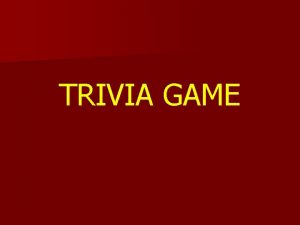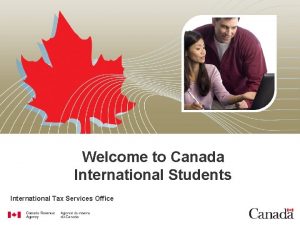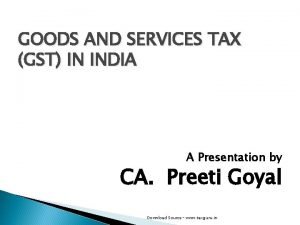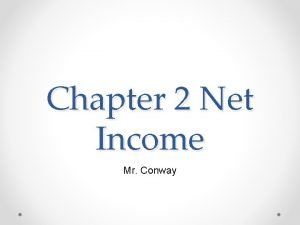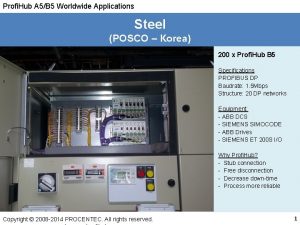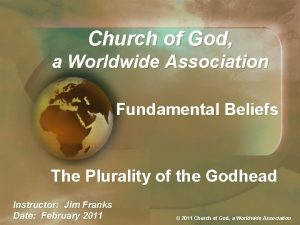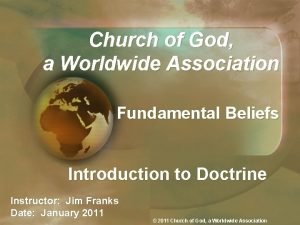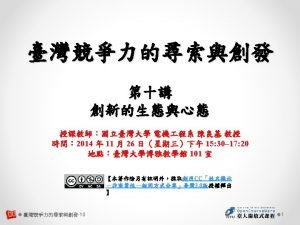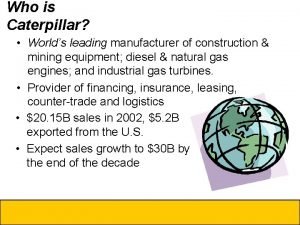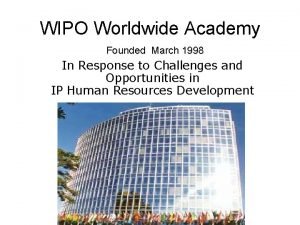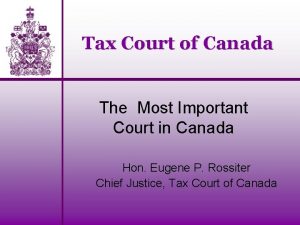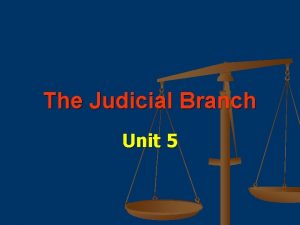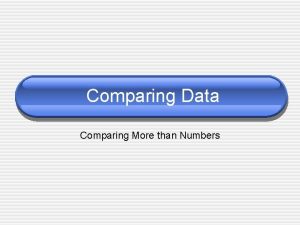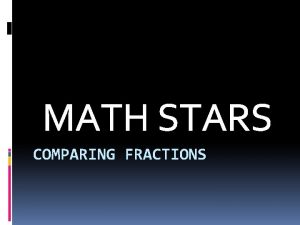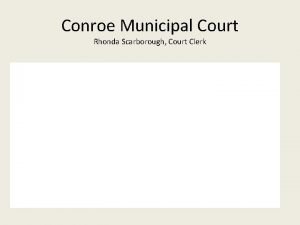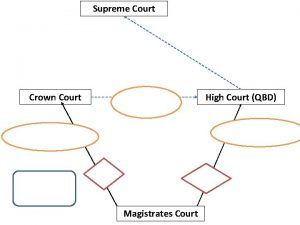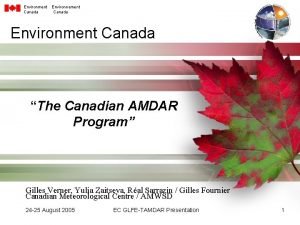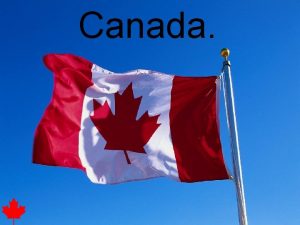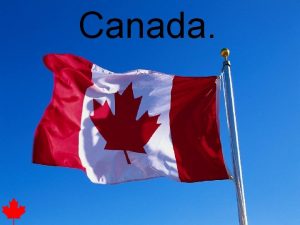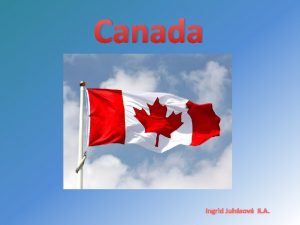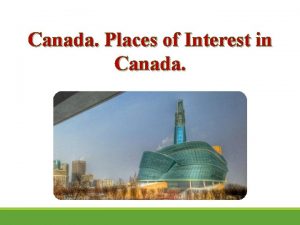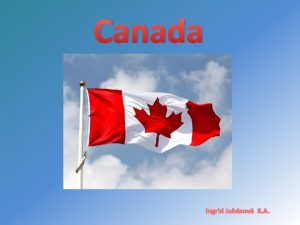Tax Court of Canada Comparing Tax Jurisdictions Worldwide
















- Slides: 16

Tax Court of Canada Comparing Tax Jurisdictions Worldwide and Common Issues of International Fiscality Rome: September 29, 2017 Prepared By: CHIEF JUSTICE E. P. ROSSITER 1

A. Tax Court of Canada: Composition: Chief Justice Associate Chief Justice 20 Puisne Judges 4+ Supernumerary Judges (34 million people) Head Office/Resides: Ottawa, Ontario, Canada Itinerant Court: Sit in 57 cities – 44 weeks per year Rolling docket Operations Local: 11 cities – full court facilities 46 cities – borrowed facilities from local courts 2

Jurisdiction: • • • Income tax – 80% GST (VAT) – 15% EI, CPP & OAS – 5% And odds and ends All of Canada - Atlantic to Pacific 49 th Parallel to the North Pole Bijural and bilingual • Judges travel every second week • Exclusively- Trial court - Not an administrative court Appeals to: • Federal Court of Appeal – 88% upheld rate • Supreme Court of Canada 3

Process: • • • Taxpayer files returns with Canada Revenue Agency Assessment (Reassessment) Notice of Objection (taxpayer) Notice of Confirmation (MNR) Notice of Appeal to TCC Limitations on Authority – only • • • Reconsideration/recalculation Allow Dismiss Vacate; or Vary No criminal authority jurisdiction. 4

Two processes: • • Informal $25, 000. 00 or less General greater than $25, 000. 00 Lay litigants 35% Counsel represented 65% In addition to trials Judges also do: • Case Management; and • Settlement Conferences 5

B. International Association of Tax Judges Historical: Establishment Statutes Activities/Annual Assemblies: • Make-up • Purpose: opportunity/forum for interaction amongst tax judges on issues of mutual concern/development • Locations • Membership • Program and how developed • Projects: o Treaty summary cases by country 6

• • o Problems • time lines • languages • central registry • resources Newsletters Internal Inquiries between judges Information circulation IFA-BEPS What do we want to do? • Permanent Scientific committee • More frequent, more informative newsletter • Chat room on common legal issues 7

• Ability/capacity to communicate in multiple languages o English o French o Italian o Spanish o German o Other • Central registry for jurisprudence generally world-wide o Treaty cases o Transfer pricing cases o International tax issues • Outreach Program to help developing tax courts/tribunals in terms of rules, practices and procedures. • One stop shopping for judicial ideas on tax reform – international tax issues. 8

• Promote dispute resolution on international tax issues. • Provide a forum or base for exchange of information and ideas on tax issues generally to the area of concern to tax judges. • Bottom line: Provide an institution for the development and assistance to tax jurists world-wide. 9

C. Canada – Judicial Organizations Two judicial organizations: Canadian Judicial Council (CJC) • Make-up/membership • Mandate o Judicial Education o Conduct o Advocacy for Judiciary • Meetings Canadian Superior Court Judges Association • Make-up/membership • Mandate • Meetings 10

D. Tax Court of Canada Judiciary: Four entities: v Federal Judicial Affairs (FJA) v National Judicial Institute (NJI) v Canadian Judicial Council (CJC) v Courts Administration Service (CAS) Recruitment: • Judicial Advisory Committee: • Make-up • Mandate • Meeting frequency • Process • Result 11

• Appointments: o Who o When o How • Security of Independence: o Tenure o Financial o Administration • Transfers o No transfers due to specialization – all judges reside in Ottawa; all judges are itinerant. • Removal: v. CJC • make-up • mandate 12

o Complaint process: § How § When § Grounds § Potential result § How it works o Parliament of Canada • Training and Education: v. National Judicial Institute • What is it • Function • How it operates: § General CLE § Special CLEs re: tax 13

v Federal Judicial Affairs: • Financial: § Salaries § Benefits § Retirement § Travel expenses • Language Training • Conduct hearings • Appointment process 14

v Courts Administration Service: • • • Administrative services to four National Courts: Federal Court of Appeal Federal Court Tax Court of Canada Court Martial Appeal Court Provide/responsibility for: Technology Security Facilities Staffing 15

• • Human resources Publication of decisions Translation services Regional offices (10) 600 staff Funded and appointed by Government of Canada All policies/procedures of government apply Supposed to be buffer between government and National Court BUT reality is they work for government 16
 Is there a basketball court above the supreme court
Is there a basketball court above the supreme court Tax court method vs irs method for rental property
Tax court method vs irs method for rental property Welcome canada amount for international students
Welcome canada amount for international students Conclusion on gst
Conclusion on gst Find the local tax deducted: $456 biweekly, 2 1/2 % tax.
Find the local tax deducted: $456 biweekly, 2 1/2 % tax. Worldwide telescope online
Worldwide telescope online Worldwide applications
Worldwide applications Church of god worldwide association
Church of god worldwide association Discussion questions about entrepreneurship
Discussion questions about entrepreneurship Worldwide interoperability for microwave access
Worldwide interoperability for microwave access Church of god a worldwide association
Church of god a worldwide association In worldwide
In worldwide Biz worldwide (pvt) ltd
Biz worldwide (pvt) ltd Caterpillar dealers worldwide
Caterpillar dealers worldwide Vorwerk direct sales
Vorwerk direct sales Wipo dl-101 final exam question paper
Wipo dl-101 final exam question paper Data access worldwide
Data access worldwide
